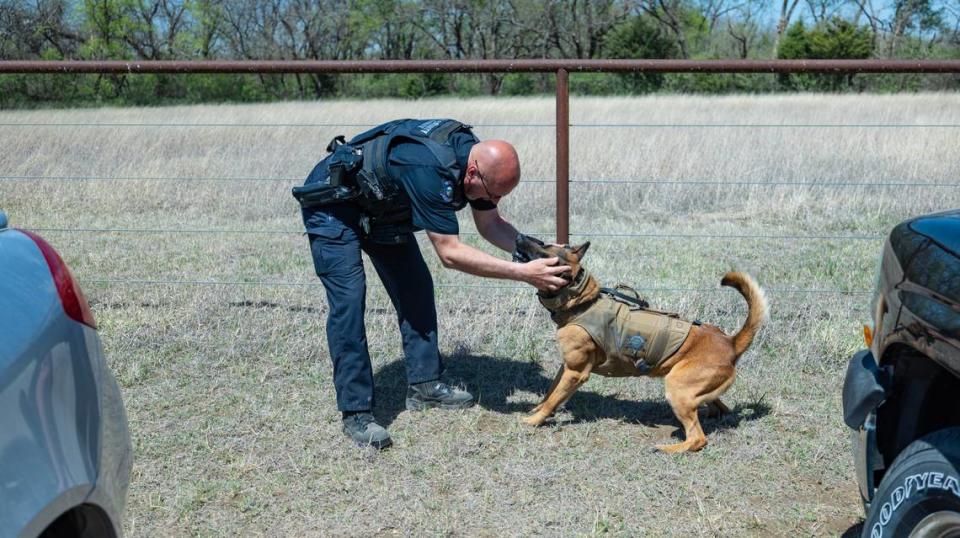Dozens of police K-9s are in Butler County this week. Here’s what they’re doing
Dozen’s of K-9 officers from roughly 37 law enforcement agencies across Kansas roamed an open field in rural Butler County.
Barks and sniffs could be heard across the field as dogs and their handlers performed training exercises during the 25th annual Kansas Police Dogs Association weeklong re-certification conference.
Training exercises include search and rescue, patrolling, detection and trailing tactics for the annual re-certification.
Most Kansas law enforcement agencies make it mandatory for their K-9 units to get re-certified, said Andover Police Department Lt. Mickey Farris, treasurer for the association.
“Each department wants to make sure their dog is suited for the streets,” Farris said.
Stevens County Sheriff’s Office deputy Chris Beltz, president of the association, has been a K-9 deputy for more than 20 years. His partner is Kleio, an 11-year-old female Belgian Malinois, one of five popular choices for their working ability and cooperation with their handlers.
“I got my partner with me all the time,” Beltz said. “There’s a whole lot more responsibility than people think about being a canine deputy ... that dog is your business.”
Most of the K-9’s live with their handlers, he said.
“Most of us don’t have the luxury of a kennel at the department where someone else takes care of your dog,” Beltz said. “The biggest percentage of these dogs are taken home to the deputy or officer’s house, so they’re basically a family member as well.”
Butler County Sheriff’s Office deputy Chip Weber attended the conference with his partner, Lego, a 2-year-old Belgian Malinois from Holland.
During a drug sniffing exercise on Tuesday, Weber and Lego snaked around several parked cars. One car had narcotics inside. Lego was tasked with sniffing out that car.
She stopped at the third car, signaling to Weber that it was the car they were looking for.
“She works her way around the vehicle searching for the strongest source of odor for narcotics,” Weber said. “She then sits down to indicate to me that she’s found it.”
As a reward, Weber tossed Lego a chew toy.

“It’s all a game to her,” Weber said. “She’s looking for that toy ... in her training, that toy was paired to the odor of the narcotics.”
Weber, who has been in law enforcement office for eight years, with one year as a K-9 handler, said he enjoys having a partner.
“She’s always there to protect me and keep me safe,” Weber said. “She is the immediate backup that can be sent into a building and whatnot and look for a bad guy.”
Outside of police work, Weber describes Lego as a social dog.
“She’s a well balanced dog,” Weber said. “She knows when it’s time to work and when it’s time to be a dog and relax.”
Veteran K-9 handler Beltz shared his thoughts about the public view of K-9 officers.
“There is a misconception where people think that when they see a K-9 it’s this big, vicious thing,” Beltz said. “Most of the canines out here are social ... they love to be petted just like your regular dogs.”
Beltz noted that they are working dogs that must have sharp focus.
“When they’re on duty they’re a whole different other dog than when they’re at home.” Beltz said. “Most of these guys if you flag them down and talk to them, they’ll be happy to get the canine out for you to observe.”
“Just don’t approach them and say ‘can I pet your dog,’ ... it’s for the public’s safety,” Beltz said.

